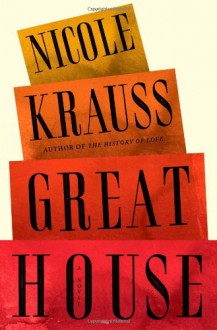
Intriguing, smart, sharp and serious reading that I had to go through twice so I could pick up all the pieces and put them together in a coherent perspective (not necessarily a good thing).
Unlike "The History of Love", this novel lacks humor and wit in its essence. It brings to us four different stories that are told as confessions and all of them are serious, dark, difficult and sorrowful. Shattered lives of people are connected through the existence and ownership of a writing desk which with its existence and even more the lack of it changes the lives of its owners.
The novel begins with the story of Nadia, a divorced writer living in New York City. She got her writing desk from a young Chilean poet, Daniel Varsky in her twenties. Her boyfriend left her and took the majority of the furniture with him. Daniel Varsky was looking for someone to take his furniture while he returns to Chile for a while. Nadia and Daniel spent one night together which ended with a single kiss and Daniel left her with his furniture from which she loved the writing desk the most. Soon after that, Daniel stopped writing to her and once she asked about him she learned that he was one of the Pinochet's disappeared. Now, a couple of decades later, a young woman by the name of Leah Weisz calls her from Jerusalem and asks about the desk because she is Daniel's daughter. She wants the desk back.
The narration continues with Aaron, the father of two sons, Uri and Dov from which Dov was the one who hurt him the most. Dov left Israel and his parents and moved to England. Now, he returned only because his mother had passed away. Aaron always found Dov difficult to love. Dov was often the reason he fought with his wife because she understood him and Aaron never did. Aaron is angered with his son because he excelled at leaving things, leaving writing when he told him to, leaving his girlfriends, parents and country behind and becoming a judge in London, leaving his position and London to come back... it seemed like leaving was all he ever knew.
The third story is told by Arthur Bender, a professor at Oxford University who loves his wife, writer Lotte Berg, very much. Lotte was a refugee and she never forgave herself for leaving her parents to die at a concentration camp in Poland. She locked a part of her life away and Arthur never had access to it. He didn't mind that part of her until one day Daniel Varsky came to their house and a couple of days later he left with his wife's beloved writing desk. Arthur started to wonder about Lotte's past and her secrets.
The final story is told by Izzy, a young American student who came to Oxford to study literature. She fell in love with Yoav Weisz, a male part of the siblings duo. He lived with his sister, Leah Weisz and under strict rules imposed by their father, George Weisz, an antiques dealer who specialized in retrieving the artifacts taken by the Nazis during the war. He will search for that writing desk through decades and it will always elude him at the last minute.
The stories told in the "Great House" are devoid of any humor, they are serious in its core, they make us feel small and unimportant under that much weight of life.
The writing desk is a symbol of life itself. It holds together his owner's life and shatters it when he leaves. The best example is Nadia, who flourished as a writer writing seven novels while she had her beloved desk. Once she gave it away, and she didn't do it because she wanted to but because she thought that was her only choice, her life crumbled. She couldn't write or organize her life. She even tried to retrieve it only to find that it never went to Jerusalem.
The stories start seemingly unconnected but through bits and pieces they start to intertwine and complete one another. The stories connect the owners through almost half a century and through three continents.
It is amazing how everything seems to fall in place when we finish the novel. But for me, this novel lacks a goal. I mean, I understand what the author is trying to tell us but the stories are very dreary and long and they have so much unimportant details that I really wished for some purpose to them. I was sorely disappointed in the end when I realized that this is it. It felt like the author abruptly ended the book because she had no more time to work on it.
I think that these kind of books are just not my cup of tea. All those dreary stories filled with sorrow, regret and how they can't seem to lead a normal life from the weight of the past was just too much for me. I like some real action, some purpose to them, some kind of revelation or twist. We all have some difficult pasts and I don't need "a writing desk" to complete me in some way. Anyway, this is a good novel for certain kind of people. Not me.

 Log in with Facebook
Log in with Facebook 





